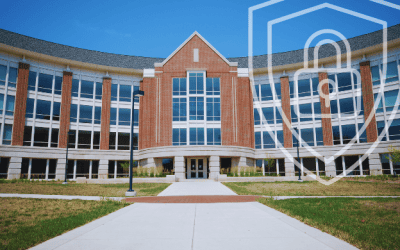Real estate companies and construction firms are increasingly becoming prime targets for cyberattacks due to several key factors. These industries not only store sensitive customer information but also utilize various digital tools and platforms, exposing them to potential cyber threats. While also, the rapid digitization of operations has created vulnerabilities that threat actors are keen to exploit.
Why are they targets?
Real estate companies are a treasure trove of valuable data that hackers crave. From financial information to personal details like Social Security numbers, realtors handle a wealth of sensitive data. According to WorldMetrics, Real Estate Agents make up 22% of spear-phishing victims in businesses, and 80% of all real estate firms cite that cybersecurity is among their top concerns. Moreover, their reliance on digital payment platforms, collaboration tools, and property tech solutions makes them susceptible to cyberattacks. Many smaller real estate offices lack robust cybersecurity measures, further increasing their vulnerability.
Traditionally the construction industry was considered less at risk due to limited personal data retention, the construction sector has faced a paradigm shift in recent years. Increased digitization, coupled with the adoption of technologies like artificial intelligence, has made it a lucrative target for cybercriminals. The lack of regulations and cybersecurity initiatives in this industry has also contributed to its vulnerability. Moreover, the interconnected nature of construction projects and the vast amount of confidential information exchanged digitally have amplified the risk of cyber threats.
Example Attacks
Real Estate Attacks:
- MLS system provider Rapattoni, causing nationwide outages and disruptions to real estate operations. This incident underscored the industry’s reliance on digital infrastructure and the potential consequences of cyber breaches.
- Fidelity National Financial, the nation’s largest title insurance company, led to a temporary halt in scheduled closings for real estate transactions. The company blocked access to systems related to title insurance, escrow, and other services after an unauthorized third party gained access and acquired certain credentials. This disruption affected agents, homebuyers, and transactions across multiple offices, with systems expected to be restored gradually. Buyers scheduled to close during the incident were informed that transactions couldn’t proceed until the systems were fully restored, causing delays and financial concerns for some parties involved.
Construction Attacks:
- Construction giants like Bouygues and Bird Construction fell victim to ransomware attacks, leading to significant disruptions and financial demands from threat actors. These attacks highlighted the critical need for robust cybersecurity measures in the construction sector.
Cybersecurity Strategies & Preventative Measures:
Despite the challenges, the real estate and construction industries have shown resilience in combating cyber threats. Collaborative efforts among professionals, MLSs, and associations have helped mitigate disruptions and strengthen cybersecurity measures. Though, proactively addressing the growing threat risk is critical to protecting sensitive data in the first place.
- Tailored Employee Training: Develop industry-specific cybersecurity training programs for real estate agents, construction project managers, and administrative staff. Include modules on identifying phishing attempts related to property transactions, recognizing fraudulent wire transfer requests, and safeguarding sensitive client information.
- Industry-Specific Security Software: Invest in cybersecurity solutions designed for the unique challenges of real estate and construction, such as securing property listings, managing construction project data, and protecting financial transactions. Look for tools that offer encryption for real estate documents, secure project management platforms, and secure payment gateways.
- Data Protection and Backup Plans: Implement robust data protection measures, including regular backups of critical project files, client contracts, and financial records. Utilize cloud storage solutions with strong encryption and access controls to safeguard sensitive information and ensure rapid recovery in case of data loss or ransomware attacks.
- Construction Site Security: Enhance security measures at construction sites by implementing access control systems, surveillance cameras, and remote monitoring technologies. Protect IoT devices used in smart construction projects from cyber threats by segmenting networks and applying firmware updates regularly.
- Supply Chain Cybersecurity: Strengthen cybersecurity throughout the supply chain by vetting third-party vendors and contractors for their cybersecurity practices. Require partners to adhere to industry-standard security protocols, conduct regular security audits, and sign data protection agreements to mitigate risks of data breaches or supply chain attacks.
- Compliance and Regulation Adherence: Stay on-top of industry-specific cybersecurity regulations and compliance requirements, such as the General Data Protection Regulation (GDPR) impacting real estate transactions or construction project data. Ensure that your cybersecurity measures align with regulatory standards and implement necessary controls to protect client confidentiality and legal compliance.
- Incident Response and Recovery Plans: Develop detailed incident response plans tailored to real estate and construction scenarios, including protocols for reporting cyber incidents, mitigating impacts, and restoring operations quickly. Conduct tabletop exercises and simulations to test the effectiveness of your response plans and refine them based on lessons learned.
- Cyber Insurance Consideration: Evaluate the benefits of cyber insurance policies specifically designed for the real estate and construction industries. Seek coverage for potential financial losses, legal liabilities, and business interruption costs arising from cyber incidents, ensuring comprehensive protection against cyber risks.
Protecting real estate and construction against growing cyber threats requires a multifaceted approach that encompasses proactive measures and collaborative efforts across the industry. The increasing digitization of operations in these sectors has made them prime targets for cyberattacks, given the valuable data they handle and the interconnected nature of their digital infrastructure. Recent incidents, such as the cyberattacks on MLS system provider Rapattoni and Fidelity National Financial, have underscored the critical need for robust cybersecurity measures. To address these challenges effectively, tailored cybersecurity strategies and preventative measures are essential.




